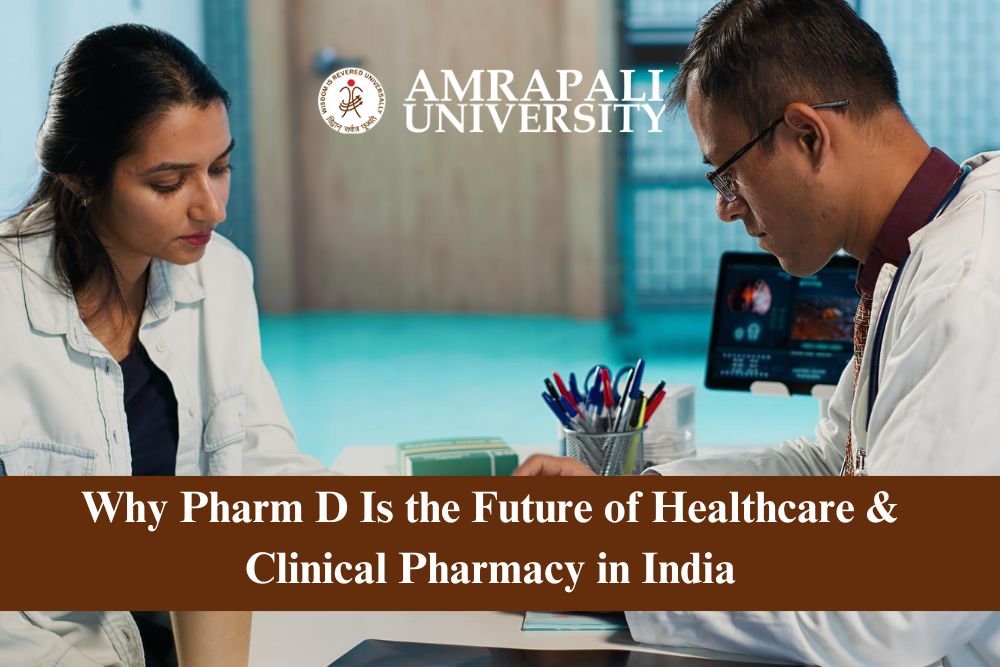Introduction:
The healthcare sector in India is undergoing rapid transformation. With the rise of chronic diseases, increasing demand for specialized care, and growing reliance on evidence-based medicine, the role of pharmacists is evolving beyond dispensing medicines. Today, pharmacists are expected to act as clinical advisors, patient educators, and active participants in healthcare teams. At Amrapali University, the pharm D colleges in uttarakhand This shift is where Doctor of Pharmacy (Pharm D) programs come into focus.
Globally recognized, Pharm D is designed to train professionals not just in pharmaceutical sciences but also in clinical practice, patient care, and research. In India, it has emerged as one of the most promising career paths for students aspiring to make a meaningful impact in healthcare. Institutions ranked among the Pharm D Colleges are leading the way in preparing students for this future by blending rigorous academics with practical clinical exposure.
This article explores why Pharm D is the future of healthcare and clinical pharmacy in India, how it differs from traditional programs, career opportunities, and why choosing the right college makes all the difference.
About Us:
Amrapali University is dedicated to advancing healthcare education through its dynamic Pharm D program, tailored for the growing demands of clinical pharmacy in India. Students are trained with hands-on learning in modern laboratories, hospital collaborations, and community health projects. The program focuses on patient care, drug safety, and therapeutic management, ensuring graduates are prepared for global healthcare standards. To complement academics, the university organizes health awareness camps, medical conferences, pharmaceutical exhibitions, and wellness initiatives that allow students to apply their knowledge in real-world contexts. The vibrant campus life also includes cultural fests, sports meets, and leadership-driven extracurricular activities that encourage all-round personality development. Known among the Pharm D Colleges, Amrapali University equips students to contribute meaningfully to healthcare innovations, clinical research, and patient safety while shaping them into compassionate professionals dedicated to improving public health outcomes.
Understanding Pharm D: More Than Just a Pharmacy Degree
Pharm D is a six-year program (five years of academics plus one year of internship/residency) that emphasizes clinical pharmacy, therapeutics, and direct patient care. Unlike traditional pharmacy courses that focus primarily on pharmaceutical sciences and industry, Pharm D focuses on:
- Clinical pharmacology and pharmacotherapy.
- Patient counseling and medication management.
- Monitoring drug interactions and side effects.
- Hospital rotations and clinical case studies.
- Research in clinical outcomes and healthcare practices.
By training pharmacists as healthcare providers, Pharm D bridges the gap between doctors and patients, ensuring better treatment outcomes.
Why Pharm D Matters in India’s Healthcare Future
- Growing Burden of Chronic Diseases : With conditions like diabetes, hypertension, and cardiovascular diseases on the rise, patients often take multiple medications. Pharm D professionals play a crucial role in managing polypharmacy, reducing drug interactions, and ensuring adherence to treatment plans.
- Shortage of Doctors in India : India faces a shortage of physicians, especially in rural and semi-urban areas. Pharm D graduates can ease this burden by acting as clinical pharmacists who monitor therapies, provide counseling, and collaborate with doctors to optimize treatment.
- Global Standards of Patient Care : The Pharm D curriculum is aligned with global healthcare standards, making Indian graduates competitive worldwide. As India integrates more with international healthcare systems, Pharm D professionals are set to play a vital role.
- Shifting Role of Pharmacists : Pharmacists are no longer confined to dispensing counters. In modern hospitals, they are part of multidisciplinary teams, contributing to clinical decisions, drug protocols, and patient education.
- Advancements in Personalized Medicine : With the emergence of genomics and personalized healthcare, Pharm D experts will help tailor medication regimens for individual patients, ensuring maximum efficacy and minimal side effects.
Career Opportunities After Pharm D
The career scope for Pharm D graduates is vast and expanding rapidly in both domestic and international markets. Key opportunities include:
- Clinical Pharmacist: Working in hospitals alongside doctors to optimize patient therapy.
- Pharmacovigilance Specialist: Monitoring and analyzing adverse drug reactions.
- Research Scientist: Conducting clinical trials and developing evidence-based guidelines.
- Healthcare Consultant: Advising hospitals and pharmaceutical companies on drug policies.
- Academician: Teaching and training the next generation of pharmacy students.
- Regulatory Affairs Specialist: Ensuring compliance with drug regulations.
- Opportunities Abroad: Countries like the USA, Canada, Australia, and Middle Eastern nations actively recruit Pharm D professionals.
These opportunities highlight why Pharm D is not just a degree but a career gateway to global healthcare leadership.
Difference Between Pharm D and Other Pharmacy Programs
Many students wonder how Pharm D differs from programs like B.Pharm or M.Pharm. Here’s a quick comparison:
| Feature | B.Pharm (4 years) | M.Pharm (2 years) | Pharm D (6 years) |
| Focus | Pharma sciences, industry roles | Research, specialization | Clinical practice, patient care |
| Patient Interaction | Limited | Limited | High (direct involvement) |
| Global Recognition | Moderate | Moderate | High |
| Career Path | Pharma industry, sales | Research, teaching | Clinical pharmacy, healthcare |
Clearly, Pharm D offers a more patient-centric approach, aligning with global healthcare needs.
Skills Developed Through Pharm D
A Pharm D program not only imparts technical knowledge but also nurtures critical professional skills:
- Clinical Knowledge: Understanding drug therapies, dosage, and treatment outcomes.
- Problem-Solving: Handling drug-related complications and emergencies.
- Research Aptitude: Designing clinical studies and analyzing healthcare data.
- Communication Skills: Counseling patients and coordinating with healthcare professionals.
- Ethics & Responsibility: Ensuring patient safety and adhering to global standards.
- Leadership: Taking initiative in hospital pharmacy management and healthcare innovations.
Graduates with these skills naturally become leaders in clinical pharmacy.
The Role of Good Pharm D Colleges in Student Success
The success of Pharm D graduates depends significantly on the quality of education and exposure they receive. That’s why studying at institutions ranked among the Pharm D Colleges is essential. Such institutions offer:
- Experienced Faculty: Professors with expertise in pharmacology, clinical pharmacy, and research.
- Hospital Tie-ups: Practical training through collaborations with leading hospitals.
- Research Facilities: Labs equipped for clinical studies, pharmacovigilance, and drug monitoring.
- Global Curriculum: Integration of international healthcare practices into the coursework.
- Placement Support: Guidance and opportunities with pharmaceutical companies, hospitals, and research firms.
This ecosystem ensures students graduate as confident, industry-ready professionals.
Global Demand for Pharm D Professionals
The demand for clinical pharmacists is growing not only in India but across the globe. According to reports:
- The global clinical pharmacy market is projected to grow exponentially due to the need for effective patient care.
- In developed countries, Pharm D is a mandatory qualification for pharmacists, giving Indian graduates an edge abroad.
- Pharmaceutical companies and hospitals worldwide prefer hiring professionals with clinical expertise, making Pharm D graduates highly employable.
This international recognition underscores why Pharm D is a future-proof degree.
Challenges and Opportunities Ahead
While Pharm D offers immense scope, there are challenges that need to be addressed for the program to realize its full potential:
- Awareness: Many students and even healthcare institutions are still unaware of the role of Pharm D graduates.
- Integration: Hospitals need to integrate clinical pharmacists more systematically into healthcare teams.
- Continuous Training: Rapid advancements in medicine demand constant upskilling of professionals.
The good news is that opportunities outweigh these challenges. With government initiatives, healthcare reforms, and global collaborations, Pharm D graduates are poised to become central figures in patient care.
Future of Pharm D in India
Looking ahead, Pharm D is set to play a defining role in the healthcare system of India. The future holds:
- Increased Demand in Hospitals: As awareness grows, more hospitals will employ clinical pharmacists.
- Stronger Role in Policy Making: Pharm D professionals may contribute to national drug policies and healthcare reforms.
- Entrepreneurship in Healthcare: Opportunities for Pharm D graduates to establish clinical pharmacy services, telehealth platforms, and consulting firms.
- Integration with Technology: Use of AI and big data in pharmacy practice will expand the role of clinical pharmacists.
In short, Pharm D graduates are not only the future of clinical pharmacy but also crucial contributors to India’s evolving healthcare landscape.
Tips for Students Aspiring to Pursue Pharm D
- Research the Curriculum: Ensure it includes strong clinical training and practical exposure.
- Choose the Right Institution: Look for recognized institutions with hospital collaborations.
- Focus on Soft Skills: Communication and empathy are as important as technical knowledge.
- Stay Updated: Follow medical journals and healthcare innovations.
- Plan Globally: Consider international certifications to expand career prospects.
Conclusion:
Pharm D is more than an academic degree—it is a career in service of humanity. At Amrapali University, the D pharm colleges in uttarakhand where by combining pharmaceutical sciences with direct patient care, it prepares professionals who are not only drug experts but also integral members of healthcare teams.
In India, where the healthcare system is rapidly evolving, the demand for clinical pharmacists is growing. Institutions counted among the Pharm D Colleges provide the ideal platform to pursue this journey. With the right training, guidance, and clinical exposure, Pharm D graduates are set to become the future leaders of healthcare and clinical pharmacy in India and beyond.
FAQs:
Q. 1 : What makes Pharm D different from other pharmacy courses?
Ans : Pharm D emphasizes clinical pharmacy, patient care, and hospital-based training, unlike traditional pharmacy programs that focus only on manufacturing and drug development.
Q. 2 : How does Pharm D contribute to better healthcare in India?
Ans : Pharm D professionals act as a bridge between doctors and patients by advising on drug interactions, dosages, and safe medication practices, improving patient outcomes.
Q. 3 : What is the career scope for Pharm D graduates in India and abroad?
Ans : Pharm D graduates can work as clinical pharmacists, drug safety associates, or healthcare consultants in hospitals, pharmaceutical companies, and international healthcare systems.
Q. 4 : Can Pharm D graduates pursue careers in research and innovation?
Ans : Yes, many pursue clinical research, pharmacovigilance, and drug safety roles. Pharm D also opens opportunities in academic research and teaching.
Q. 5 : How do internships enhance Pharm D students’ learning experience?
Ans : Internships in hospitals provide real-time patient exposure, case handling, and interaction with healthcare teams, making graduates more effective professionals.
Q. 6 : What extracurricular activities benefit Pharm D students?
Ans : Healthcare camps, seminars on drug awareness, and volunteering opportunities in medical outreach programs help students develop practical skills and social responsibility.



